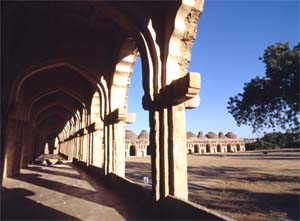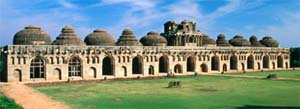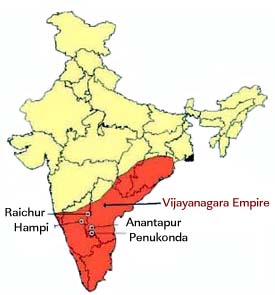Feb 22, 2026
Feb 22, 2026
Historical and archaeological records are replete with examples of empires that attained glory at some time and then suddenly vanished. Reasons could be many. In the past invasions were common and many of the empires succumbed to them. Question is what was the necessity to invade? Was it just a political ambition to enlarge the area of the kingdom or was it due to lure of riches, natural or amassed by the kings! As the story goes Vidhyaranya was a great sage at Anegondhi on the banks of Thunga-Bhadra River. At present it falls near present Hospet, district Bellary in Karnataka. In 1333 AD the sage Vidhyaranya blessed two brothers Hakka and Bukka. These brothers established an empire that came to be known as the Vijayanagara Empire, which spread all over the Deccan of India. Krishnadevaraya the Telugu speaking king from Tulu dynasty of Karnataka ruled this Empire from 1505 to 1540 AD. During his regime the capital at Hampi grew tremendously. Historians like Sewell, Rama Sharma, H. Heras, S.B. Row etc have described how the Empire attained its nadir during Krishnadevaraya's reign and how the capital at Hampi developed. The Moguls repeatedly raided Vijayanagara just to have control over the diamond mines. The Empire on the other hand was strengthening its position by acquiring sophisticated arms and better quality horses to dispel the raids by the Moguls. Thus the race for controlling sandalwood, spices and diamonds was on.
There was one such empire in south India, the Vijayanagara Empire. We shall read about the rise and fall of this empire as a classic example of plunder of natural resources. It is not the fall of the empire that matters now, what matters is that like our territories we must preserve and conserve our natural resources.

Archways of the Elephant Stables, HampiThe remnants of Hampi even today are spread vast over kilometres of rugged terrain. The architecture of the ruins makes one wonder at the amazing skill of the artisans! The King's and Queen's quarters reports Ashokmitran in the Hindu Magazine dated 5 August 2007 have been built according to Vastu specification. Alas all that is left now are the ruins of the basements.
 As per the historical records the glorious capital of a flourishing empire was completely destroyed after a single battle; the battle of Rakshasatangadi. During its hey days a large number of scholars, travelers, merchants and visitors from far off China, Arabia and Europe used to throng the empire to see its riches and splendor and also for trade.
As per the historical records the glorious capital of a flourishing empire was completely destroyed after a single battle; the battle of Rakshasatangadi. During its hey days a large number of scholars, travelers, merchants and visitors from far off China, Arabia and Europe used to throng the empire to see its riches and splendor and also for trade.
An empire of the size of Vijayanagara vanished? Why? But so did the Roman Empire of Greece or Pharaohs of Egypt or the civilizations of Indus valley. To understand that we have to understand how does an empire grow, or how does a particular species of an animal or plant grow in a particular area.
A species grows in an area because it develops capability to convert the available resources for its use. We know that when a species proliferates there is a struggle for existence and the fittest survive. Those who are able to utilize the resources to their maximum benefit and they survive and thrive.
Similarly natural calamities apart, empires thrived and the ability of its population to convert the available natural resources for food, shelter, communication and military might. Military means men, weapons, horses, and elephants etc. Military also means a large congregation of troops and animals to be fed. Naturally lots of food is required all of a sudden at one place. Thus the ability to utilize the natural resources matters a lot. Most empires through the ages usurped not their own natural resources but even those of the neighbors too. End result was devastation of neighbors and finally doom of their empire too, because of lack of natural resources.
All animals including the humans have an instinct to dominate over the weaker ones of the same species. Since times immemorial this 'animal' instinct in the humans to dominate the weaker nations exists even today. Nations that are strong today are strong in terms of their military might too. Because domination it seems is impossible without a race for the arms! The colonial British Empire that ruled over greater part of the world in recent past is one such example.
K.N. Ganeshaiah and R. Umashanker of School of Ecology and Conservation, University of Agricultural Sciences, banaglore and R. Vasudeva of College of Forestry, Sirsi recently published their observations and analysis of the rise and fall of Vijayanagara Empire in Current Science.
Ganeshaiah and his colleagues found that Vijayanagara became a super power because of its horses and knighted warriors. The horses played a major role. They were of strategic importance to the rulers of Viajayanagara, as they were the fastest mode of moving from one place to another. The rulers of Viajayanagara bought rights to procure horses from the Portuguese so that their enemies in the north could not get the horses. Though it meant a higher cost but as long as their enemies were deprived of the quality horses the cost had little meaning.
One can imagine the cost that the ruler of Vijayanagara, Krishnadevaraya offered the Europeans a sum of '20,000 to buy the exclusive rights for the procurement of horses.
The arrival of the Europeans added yet another fancy to the kingdoms of the yore, an arsenal of guns. They were far more effective weapons because they were effective as a destroyer even from a distance. The ancient bow and arrows was no match against the guns. The moment the Europeans trudged through the Vijayanagara territory they were able to evaluate the natural resource potential of the Empire. Thus there was a mutual shake hand between the two and a barter of guns and horses took off in lieu of the natural resources like Sandalwood, Spices and Diamonds.
Amongst the natural resources Sandalwood has age old association with the region. Ganeshaiah writes that when the distribution of sandalwood was traced in south India from historical and botanical archives, it was found to coincide with the boundaries of the Empire. Infact the region was known as 'Chandanad Nadu' or the land of sandalwood. And Vijayanagara Empire was also known as Karunadu or the land of Kannada speaking people, because of a larger chunk of the empire being in what is now known as the Karnataka. Thus since times immemorial Karanataka is associated with sandalwood.
For Arabs and European sandalwood was a rare commodity. Europeans too fancied the Asian spices and some of the historians believe they colonized India for their fancy. For the Portuguese sandalwood was such a fancy that they fought to gain control over a small island, Timor in the Pacific Ocean. Wars continued for years while the sandalwood trees were being plundered. It led to a new political development and East and West Timor became two separate entities controlled by the Portuguese and the Dutch respectively.
In terms of quality the Indian sandalwood was far superior to that of Timor. Vijayanagara rulers realized this potential and the vicious circle of buying arms to control more and more areas rich in sandalwood started. The British kept a steady supply of arms and collected their quota of sandalwood. Krishnadevaraya led military expeditions to neighboring empires to achieve this goal and control over sandalwood gave a great economic boost to his kingdom.
The Europeans hiked the prices of spices and made lots of money from spice trade. They would buy spice from India and the money they paid brought wealth, weapons and horses for the rulers of Vijayanagara Empire. In AD 1509 when Krishnadevaraya was the crowned king found the Love of Europeans for spices. In order to meet the increasing demand of spices Vijayanagara Empire raided and captured huge tracts of spice producing country of Western Ghats. The spices helped them to add better quality steeds and weapons. In present day terminology it was an arms race.

Political Map of Vijayanagara Empire
Courtesy of Current Science, Bangalore, IndiaA large part of the Vijayanagara Empire, including the Capital at Hampi is situated on 3600 million year old rocks of the Precambrian era of the earth's history. These ancient or the basement rocks are known for their content of precious stones and noble metal, gold. It is believed that precious stones and diamonds used to be sold in heaps along the roadsides in the Hampi market. As per the historical records Raichur (Doab) an area between the Rivers Krishna and Thunga-Bhadra was the major source of world's diamond supply prior to development of the first diamond mine in south Africa towards the end of 16th century. Vijayanagara Empire by then extending upto Sri Lanka had complete control over the diamond mines from Raichur to Sri Lanka.
The Vijayanagara Empire was busy exploiting its natural resources to strengthen the army. And the army had to be constantly kept strong to maintain the control over the areas producing sandalwood, spices and diamond. Thus it was a vicious circle. The downfall of the Empire could have been due to overexploitation of the resources or loss of control over the resources feel Ganeshaiah and his co-workers.
Compared to the Portuguese's, the British were more intelligent. Instead of succumbing to the demands of Vijayanagara Empire before parting with its wealth of resources, they developed Diamond mines in Africa and encouraged areas outside the control of Vijayanagara for cultivating the spices. Therefore, while the arrival of Europeans had given a boost to the Vijayanagara's economy, trade and military might, the arrival of the British was a big blow.
Indiscriminate exploitation, zeal to develop military might at the cost of natural resources and of course the shrewd strategy of the British all led to downfall of an Empire that was supposed to be indestructible.
The importance of sustainable development of a nation/empire is thus evident from the rise and fall of Vijayanagara Empire. Had they maintained a balance between the availability of the natural resources and war strategies to fight their enemies, perhaps the history of India would have been something different today! But the way the empires have risen and perished due to over exploitation of resources is a pointer that the contemporary democracies world over including India cannot survive for long unless there are measures to control overexploitation of natural resources and environment.
09-Sep-2007
More by : V. K. Joshi (Bijji)

|
Fall of Vijayanagara is not only associated with its own defects. Delhi Sultanates ransacked Vijayanagara for days and months. Depopulated the city, destroyed temples in the name of Islam. Islam is threat even today. Even in current world we can see Islamic invasion. Please, correct your article. If you dont know history, dont imagine. Just do some research. Truth to be told and not to hide. |

|
Please analyze the rise and fall of the British Empire. |

|
Thanks Dr Chaluvaraju. Apologies for delayed reaction. I was occupied elsewhere. |

|
sir excellent |

|
Thanks K. Surya. As you might have noticed that I am a free lance writer and do some research before writing a piece. Currently I am busy with a history based novel, hence there will be some delay in writing more about Vijaynagar. I am keen to write about the place, as my name to happens to be Vijay! |

|
excellent biography of vijayanagar empire can i have more details |

|
Thank you Sumanth. I am sorry I can not satiate your desire to know more about the history of Vijayanagar. But yes I agree that despite heavy odds, Vijaynagar could maintain its sanctity. God willing some day I will try to write more about it. Thanks for your comments-they boost my morale. |

|
excellent article. i would like to know more of the fall of vijaynagar. Do you realize our history books are silent on Vijaynagar empire. An empire but for which the south would have been full of mohammedian monuments rather than temples. Almost all the great temples in the south including Tirupathi were greatly benefited and survived destruction at hordes of muslim invaders. For almost 300 years vijaynagar kept islam from entering the south. |

|
Thanks Sreenivasan, may your prayers come true! |

|
Good.. I always wonder how we succumbed to foreign forces despite armed with good philosophy and best civilization values. Let our Ancient Rishis bless us to develop to have more Krishna Deva Rayars in this Holi land, Bharat mata. |

|
Thank you Ramesh K Balaguru. |

|
excelent |

|
Thank you Anj. |

|
excellent |